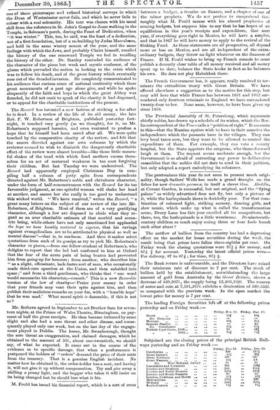The Record has invented a new fashion of striking a
foe after he is dead. In a review of the life of its old enemy, the late Re;r. F. W. Robertson of Brighton, published yesterday fort- night, it touched very gently (as we thought), for it, on Mr. Robertson's supposed heresies, and even ventured to profess a hope that he himself had been saved after all. We were quite touched by the comparative charity of the review, and felt that the sneers directed against our own columns by which the reviewer seemed to wish to diminish the dangerously charitable effect of the review were almost loveable—like those little mourn- ful shakes of the bead with which fond mothers excuse them- selves for an act of maternal weakness in too soon forgiving their children. But last Tuesday we were undeceived. The Record had apparently employed Christmas Day in com- piling half a column of petty spite from correspondents directed against Mr. Robertson's noble and chivalrous character, under the form of half-remonstrances with the Record for its too favourable judgment, as one spiteful woman will shake her head at another, and assure her she really is too good to understand this wicked world. " We have received," writes the Record, " a great many letters on the subject of our review of the late Ur. Robertson, of Brighton. Most of them are of a very gratifying character, although a few are disposed to ehide what they re- gard as an over charitable estimate of that morbid and eccen- tric being, while others have not only sanctioned but applauded the hope we have humbly ventured to express, that his ravings against evangelicalism are to be attributed to physical as well as mental disease"—that is, tomadness. And then it makes select ,quotations from such of its gossips as try to pick Mr. Robertson's character to pieces,—from one fellow-student of Robertson's, who delights to report that the lad had confessed to him at Oxford that the fear of the acute pain of being beaten had prevented him from going up for honours ; from another, who describes him " as a slight, effeminate, lack-lustre sort of man, who occasionally made third-rate speeches at the Union, and then subsided into space ;" and from a third gentleman, who thinks that " one word would summarize his character,—conceit." This is a new Recordite version of the law of charity—' Praise your enemy in order that your friends may vent their spite against him, and then publish their malicious remarks on your foe, with a "humble hope" that he was mad.' What moral spirit is damnable, if this is not so ?






























 Previous page
Previous page